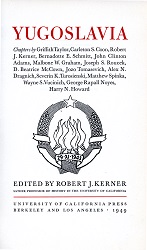Yugoslavia, the Little Entente, and the Balkan Pact
Yugoslavia, the Little Entente, and the Balkan Pact
Author(s): Harry N. Howard
Subject(s): Period(s) of Nation Building, Between Berlin Congress and WW I
Published by: CEEOL Digital Reproductions / Collections
Keywords: Dositej Obradović; Vuk Karadžić; Ljudevit Gaj; Strossmayer;
Summary/Abstract: Yugoslavia, like Czechoslovakia and Rumania, was one of the pioneers in building the Little Entente. Moreover, like Greece, Turkey, and Rumania, Yugoslavia played a significant role in constituting the Balkan Pact of February, 1934, and in developing the Balkan Entente, which was constructed on the foundations of the Balkan Pact. Yugoslav statesmen and the people whom they served must be accredited with vision and wisdom in anticipating those institutions on which Danubian and Balkan unity were to be built. To the peoples of Yugoslavia, the dream of some sort of union was not new, though it took many forms as it moved along the paths of historical evolution. One might turn to the era of Tsar Stephen Dušan the Mighty, in the mid-fourteenth century, or move rapidly into the late eighteenth and early nineteenth centuries and not mistake the dream. Along with Rhigas Pheraios, one remembers Dositej Obradović and Vuk Karadžić, all of whom thought in terms of a union of the South Slavs of the Balkan Peninsula, as did the Croatian, Ljudevit Gaj, the leader of the Illyrian movement and the editor of the Ilirske Narodne Novine. Nor could one overestimate the lifework of Bishop Strossmayer, the great Croatian priest-statesman, who also envisioned a Balkan union.
Book: YUGOSLAVIA
- Page Range: 319-337
- Page Count: 19
- Publication Year: 1949
- Language: English
- Content File-PDF

